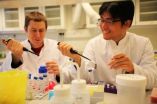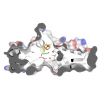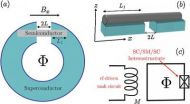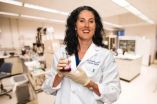(Press-News.org) Patients who drank coffee, rather than water, after bowel surgery to remove a part of their colon experienced a quicker return to bowel movements and tolerance of solid food.
Those are two of the key findings of a comparative study of 80 patients, carried out at University Hospital Heidelberg, Germany, and published in the surgical journal BJS.
"Post-operative bowel obstruction is a common problem after abdominal surgery and the aim of this study was to test our theory that coffee would help to alleviate this" says lead author Dr Sascha Müller, who is now based at Kantonsspital St Gallen, Switzerland.
The 80 patients were randomised into coffee and water groups before their operation, with one patient in the water arm subsequently excluded due to a change in their surgical procedure.
Patient characteristics were similar in both groups. Their average age was 61 years and 56 per cent were male.
Just over half (56 per cent) had colonic cancer, 28 per cent had diverticular disease (a structural problem with the wall of their colon), 13 per cent had inflammatory bowel disease and four per cent had other conditions. The majority had open surgery (61 per cent) and the remainder had laparoscopic surgery.
The patients were given 100mls of coffee or water three times a day.
Key findings were:
Time to first bowel movement after surgery was just over 60 hours in the coffee group and 74 hours in the water group.
The coffee group were able to tolerate solid food in just over 49 hours, compared to just under 56 hours in the water group.
The coffee drinkers were also able to pass wind just under 41 hours after surgery, compared with over 46 hours for the water group.
Length of hospital stay and ill health were similar in both groups.
"This randomised trial showed that the time to first bowel movement after surgery was much shorter in the coffee drinkers than the water drinkers" says Dr Müller.
"Although 10 per cent of the patients did not want to drink strong coffee at this time, it was well accepted by the group and no coffee-related complications were noted.
"It is not clear how coffee stimulates the intestine and caffeine appears to have been ruled out by previous studies, which found that decaffeinated coffee, which was not used in this study, also has beneficial effects.
"Whatever the mechanism, it is clear that postoperative coffee consumption is a cheap and safe way to activate bowel motility after elective colonic surgery."
###
The article can be viewed free online at: http://onlinelibrary.wiley.com/doi/10.1002/bjs.8885/abstract
Coffee speeds up return of bowel function after colon surgery
2012-10-09
ELSE PRESS RELEASES FROM THIS DATE:
Glowing DNA invention points towards high speed disease detection
2012-10-09
Links to publications:
http://pubs.acs.org/doi/abs/10.1021/nn302633q
http://pubs.acs.org/doi/abs/10.1021/ac201903n
...
Mayo Clinic researchers stop neuromyelitis optica attacks with new therapy
2012-10-09
ROCHESTER, Minn. -- Mayo Clinic researchers have identified a new therapy for patients with neuromyelitis optica that appears to stop inflammation of the eye nerves and spinal cord. NMO is a debilitating central nervous system disorder that is often misdiagnosed as multiple sclerosis (MS). In the study, patients with severe symptoms of the disease, also known as NMO, were given eculizumab, a drug typically used to treat blood disorders.
While not a cure, the therapy Mayo Clinic researchers used in the study to halt attacks could potentially lead to longer attack-free ...
Dead stars could be the future of spacecraft navigation
2012-10-09
Scientists at the National Physical Laboratory (NPL) and the University of Leicester have been commissioned by the European Space Agency (ESA) to investigate the feasibility of using dead stars to navigate spacecraft in deep space. The findings of the research will advise ESA strategy and if feasible this technique may in future revolutionise the way spacecraft navigate in the outer Solar System and beyond.
Spacecraft navigation currently relies on radio transmissions between a distant craft and a network of ground-stations on Earth. This means that the craft has to ...
IspH -- a protein free to choose its partners
2012-10-09
This press release is available in German.
The iron-sulfur protein IspH plays a central role in the terpene metabolism of several pathogens. The mechanism of the reaction provides an approach for developing new antibiotics, particularly against malaria and tuberculosis. While researching this enzyme, biochemists at the Technische Universitat Munchen discovered a previously unknown reaction: IspH accepts two completely different classes of molecules as partners. This surprising insight, published in Nature Communications, opens up new perspectives in combating infectious ...
Scientists discover gene behind rare disorders
2012-10-09
Scientists at the Montreal Neurological Institute and Hospital – The Neuro, McGill University working with a team at Oxford University have uncovered the genetic defect underlying a group of rare genetic disorders.
Using a new technique that has revolutionized genetic studies, the teams determined that mutations in the RMND1 gene were responsible for severe neurodegenerative disorders, in two infants, ultimately leading to their early death. Although the teams' investigations dealt with an infant, their discovery also has implications for understanding the causes of ...
Chaperone protein subverts removal of glaucoma-causing protein
2012-10-09
Tampa, FL (Oct. 8, 2012) -- The chaperone protein Grp94 can interfere with the clearance of another protein known to cause the glaucoma when mutated, a new study led by researchers at the University of South Florida has found. Using a cell model, the researchers also demonstrated that a new specific inhibitor of Grp94 facilitates clearance of the genetically-defective protein, called myocilin, from cells.
Reported online this month in JBC (The Journal of Biological Chemistry), the discoveries could lead to a new treatment for some hereditary cases of glaucoma, an eye ...
Topological superconductors
2012-10-09
If quantum computers are ever going to perform all those expected feats of code-breaking and number crunching, then their component qubits---tiny ephemeral quantum cells held in a superposition of internal states---will have to be protected from intervention by the outside world. In other words, decoherence, the loss of the qubits' quantum integrity, has to be postponed. Now theoretical physicists at the Joint Quantum Institute (JQI) and the University of Maryland have done an important step forward to understand qubits in a real-world setup. In a new study they show, ...
Bioenergy - The broken promise
2012-10-09
Biofuels are going to save us from climate threats and the oil crisis, while at the same time providing an opportunity to the smallholder farmers of the world. Hopes are high, but completely unrealistic. It is like trying to push a square peg into a round hole, according to a current thesis at Linköping University.
Bioenergy could replace fossil fuels and solve the looming energy crisis. Into the bargain, we will benefit from reduced greenhouse gas emissions. A further bonus could be that demand for biofuels gives a lift to smallholder farmers in poor countries, who would ...
Doubling up on advanced prostate cancer with PARP inhibitors
2012-10-09
A newly discovered function of PARP-1 could be the key to more effective therapeutics to treat advanced prostate cancer patients, a recent preclinical study published in Cancer Discovery by Jefferson's Kimmel Cancer Center researchers suggests.
The team, led by Karen E. Knudsen, Ph.D., Professor in the Departments of Cancer Biology, Urology, & Radiation Oncology at Thomas Jefferson University, found that functions of PARP-1 not only include DNA damage repair but also androgen receptor (AR) regulation in advanced prostate cancer growth and progression. PARP inhibition ...
Chronic kidney disease alters intestinal microbial flora, UCI study finds
2012-10-09
Irvine, Calif., Oct. 9, 2012 – Chronic kidney disease changes the composition of intestinal bacterial microbes that normally play a crucial role in staving off disease-causing pathogens and maintaining micronutrient balance, according to UC Irvine researchers.
This profound alteration of the gut microbial population may contribute to the production of uremic toxins, systemic and local inflammation, and nutritional abnormalities present in patients with advanced renal disease, they said.
Study leader Dr. N.D. Vaziri of the UCI School of Medicine's Division of Nephrology ...



